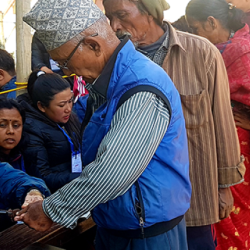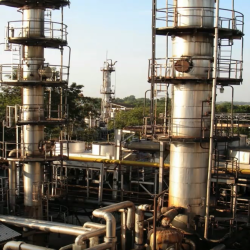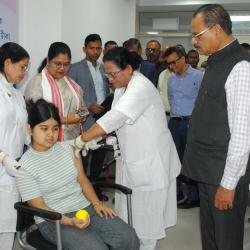The greatest challenges facing persons with disabilities lie in the areas of access, education and employment, said Ms Anju Talukdar, coordinator, Disability Law Unit, NE. Addressing the media persons at Guwahati Press Club on December 31, 2008, she expressed concern over the physical barriers in the environment coupled with societal prejudice severely restrict and often completely block available opportunities. One of the laws enacted to ensure the protection of persons with disabilities in India is the 'Persons with Disabilities (Equal opportunities, protection of rights and full participation) Act 1995. Unfortunately, even with its many beneficial provisions, the said Act has failed to achieve its objectives due to poor implementation and in many cases non-implementation of its provisions. This was simply demonstrated in a recent case involving admissions to seats in paramedical courses in the three medical colleges of Assam.
On May 12, last an Educational Notice was issued by the Director of Medical Education, Assam, for admission to paramedical courses in the three medical courses. A total of 400 seats were to be filled up among 12 different paramedical courses. The Act guarantees certain rights to persons with disabilities including the right spelt out in Section 39 which says "all educational institutions to reserve seats for persons with disabilities. All government educational institutions and other educational institutions receiving aid from the Government shall reserve not less than three percent seats for persons with disabilities."
The advertisement issued by the Director of Medical Education provided for three per cent reservation for persons with disabilities, but the definition of who is a person with disability was as unique as it was inaccurate. It was also clearly contrary to the law, she said. Under the Persons with Disabilities Act 'person with disability' means a person with 40 per cent or more of blindness, low vision, leprosy-cured, hearing impairment, locomotors disability, including cerebral palsy, mental retardation and mental illness.
This very clearly definition of disability as spelt out by the law was not enough for the authorities. They came up with their own definition and as per the admission notice, three percent reservation quota would be made available for persons with disabilities, but 'only the persons with locomotors disability of the lower limbs and having 50 to 70 per cent of disability shall be eligible for this quota.'
This was clearly against the provisions of the Act. Anju Talukdar and Rakhi Sirauthia Choudhury of the Disability Law Unit, Northeast challenged this educational notice in the Gauhati High Court in a Public Interest Litigation, which was numbered as PIL 34/2008. This Unit is a project of Shishu Sarothi and fights for the rights of persons with disabilities by creating awareness on the various disability laws, advocating disabled friendly policies and facilitating litigation in case of violation of rights.
The case was argued on behalf of the petitions by their counsel, Siddharth Shankar Dey, renowned advocate of the Gauhati High Court and strong defender of disability rights. On June 16, 2008 the petition was admitted by the court and as an interim measure, the authorities were directed to receive applications from all categories of persons with disabilities. On June 27, the Director of Medical Education issued a corrigendum inviting applications from all categories of persons with disabilities.
The Division Bench of the Hon'ble Chief Justice J Chelameswar and Hon'ble Mr. Justice A Potsangham on December 17 last allowed the petition directing that three percent reservation for persons with disabilities would be available for all categories of disabilities. The High Court rejected the argument of the State of Assam that restricting the reservation to only the persons with locomotors disability of the lower limbs and having 50 to 70 percent of disability was justified under the guidelines of the Medical council of India. Interestingly, the documents relied on by the State of Assam itself showed that the Medical Council of India had prescribed guidelines only with reference to admissions to MBBS and PG medicine courses. No mention was made of paramedical courses. Further, there was nothing in the law to exclude persons with other disabilities from qualifying on merit to the paramedical courses. So no such exclusion can be made for seats reserved for persons with disabilities.
The decision of the Gauhati High Court is a huge encouragement to the disability sector –not just in Assam, but the entire Northeast and in fact the whole country. It is often seen that government authorities neglect and ignore their obligations under the law. There has often been no other recourse available but to approach the courts to secure the rights and interests of the persons with disabilities. While the executive continues to pose obstacles in the path, it is a huge relief that the judiciary has consistently proved a bastion and bulwark in defense of persons with disabilities, said Ms Talukdar.
On May 12, last an Educational Notice was issued by the Director of Medical Education, Assam, for admission to paramedical courses in the three medical courses. A total of 400 seats were to be filled up among 12 different paramedical courses. The Act guarantees certain rights to persons with disabilities including the right spelt out in Section 39 which says "all educational institutions to reserve seats for persons with disabilities. All government educational institutions and other educational institutions receiving aid from the Government shall reserve not less than three percent seats for persons with disabilities."
The advertisement issued by the Director of Medical Education provided for three per cent reservation for persons with disabilities, but the definition of who is a person with disability was as unique as it was inaccurate. It was also clearly contrary to the law, she said. Under the Persons with Disabilities Act 'person with disability' means a person with 40 per cent or more of blindness, low vision, leprosy-cured, hearing impairment, locomotors disability, including cerebral palsy, mental retardation and mental illness.
This very clearly definition of disability as spelt out by the law was not enough for the authorities. They came up with their own definition and as per the admission notice, three percent reservation quota would be made available for persons with disabilities, but 'only the persons with locomotors disability of the lower limbs and having 50 to 70 per cent of disability shall be eligible for this quota.'
This was clearly against the provisions of the Act. Anju Talukdar and Rakhi Sirauthia Choudhury of the Disability Law Unit, Northeast challenged this educational notice in the Gauhati High Court in a Public Interest Litigation, which was numbered as PIL 34/2008. This Unit is a project of Shishu Sarothi and fights for the rights of persons with disabilities by creating awareness on the various disability laws, advocating disabled friendly policies and facilitating litigation in case of violation of rights.
The case was argued on behalf of the petitions by their counsel, Siddharth Shankar Dey, renowned advocate of the Gauhati High Court and strong defender of disability rights. On June 16, 2008 the petition was admitted by the court and as an interim measure, the authorities were directed to receive applications from all categories of persons with disabilities. On June 27, the Director of Medical Education issued a corrigendum inviting applications from all categories of persons with disabilities.
The Division Bench of the Hon'ble Chief Justice J Chelameswar and Hon'ble Mr. Justice A Potsangham on December 17 last allowed the petition directing that three percent reservation for persons with disabilities would be available for all categories of disabilities. The High Court rejected the argument of the State of Assam that restricting the reservation to only the persons with locomotors disability of the lower limbs and having 50 to 70 percent of disability was justified under the guidelines of the Medical council of India. Interestingly, the documents relied on by the State of Assam itself showed that the Medical Council of India had prescribed guidelines only with reference to admissions to MBBS and PG medicine courses. No mention was made of paramedical courses. Further, there was nothing in the law to exclude persons with other disabilities from qualifying on merit to the paramedical courses. So no such exclusion can be made for seats reserved for persons with disabilities.
The decision of the Gauhati High Court is a huge encouragement to the disability sector –not just in Assam, but the entire Northeast and in fact the whole country. It is often seen that government authorities neglect and ignore their obligations under the law. There has often been no other recourse available but to approach the courts to secure the rights and interests of the persons with disabilities. While the executive continues to pose obstacles in the path, it is a huge relief that the judiciary has consistently proved a bastion and bulwark in defense of persons with disabilities, said Ms Talukdar.
- Add new comment
- 17892 reads










Comments
Pages
Add new comment